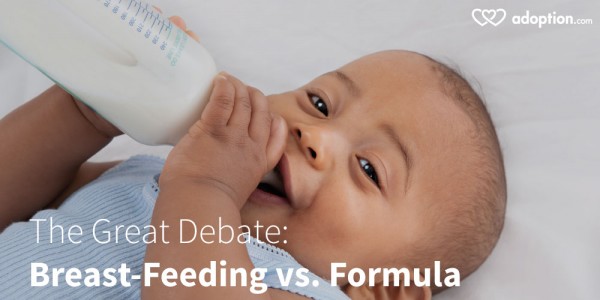Prior to the introduction of formula, women who were unable to breast-feed their child had to use a wet nurse: a woman who could breast feed the child for her. As technology, bottles, animal milk, and formulas were introduced, there became more options for providing our children nutrition. “By the 1940s and 1950s, physicians and consumers regarded the use of formula as a well-known, popular, and safe substitute for breast milk. Consequently, breastfeeding experienced a steady decline until the 1970s.”
As physicians and marketing campaigns began to butt heads, society started a battle on which method was best. Formula companies include a “breast is best” message, ensuring they are meeting the standards put forth medically while promoting their product as an alternative. With mommy wars in full force, adoptive parents often feel a huge judgment from society if we formula feed our children. The expectations and the studies on nutrition and bonding have made it even more of an issue for adoptive mothers who already feel as if they are not going to provide enough for their new child. Many families look into adoptive breast-feeding, breast milk banks, wet nurses, and other sources for obtaining breast milk as a result of this judgment.
Thirteen years ago, I gave birth to my biological son. At first, I had no desire to breast-feed; to be honest, it creeped me out. The nutritionist at my doctor’s office encouraged me to read a few books about breast-feeding, and I decided to go for it. I breast-fed him for nearly 15 months. Many years of infertility followed, and when my husband and I decided to adopt our second child, I grew intensely afraid of not being able to bond or provide the same nutrition to my second son as I did my first. I “lucked out” in that I knew it was possible to lactate while not having given birth. I say it that way because I was diagnosed with a prolactin-secreting tumor on my pituitary gland that caused me to lactate! So, while I was risking the tumor to reactivate and grow, I decided to pursue a protocol that would cause me to re-lactate.
While I did regain some milk, I never achieved a full supply, and I was forced to face my worst enemy. . . FORMULA. I briefly considered myself a failure. I had let my son down. But when I started researching formulas, I found that the advances in nutrition have come a long way! Thirteen years prior, with my first son, formula was not only expensive, but didn’t contain some of the vital nutrients that breast milk contained that promoted brain development and immune system strength. While I am not claiming it is a perfect replacement, it is a satisfactory alternative.
As mothers, we should know better than to judge other moms for which feeding method she chooses. Breast verses bottle should not cause sideways stares and stink-eyes from other moms. We don’t know what the reason behind the bottle is. The child may have been adopted, the mother could be on medication, or the mother could have had many painful weeks or months of trying to breast feed, but was unsuccessful. We don’t know the struggles or the reasons for feeding formula over nursing. What we do know is that while there are still many arguments for the benefits of breast-feeding, formula is not bad. Some children fail to thrive on breast milk, just as not every formula is created equal. It is a process to find the right product or method for each child. There are generic brands, name brands, and organic formulas on the market; each with many wonderful qualities and serving great nutrition.
Today I have two very healthy, smart, normal weight, and active boys. I am well-bonded with both, despite formula feeding one. As an adoptive mom who also has a biological son, I felt additional pressure to provide the very best for him. I was conditioned to believe that breast was the VERY best. Maybe it is, but formula wasn’t bad. I have parented both of my children the same. I love them the same. There is no need for me to feel guilt for not being able to force my body into doing something it wasn’t naturally going to do since I didn’t give birth to him. I would have loved to provide that, but I am not ashamed that he thrived on formula, either.
Stand strong on your choice and be proud that you are raising an awesome kiddo, no matter what they are fed as infants.

